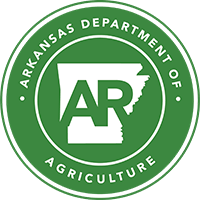Plant Industries
Serving the citizens of Arkansas and the agricultural and business communities by providing information and unbiased enforcement of laws and regulations set by the Arkansas State Plant Board
Fertilizer
Click here to view the Annual Fertilizer Reports
Frequently Asked Questions - Fertilizer
1. Q: What is the difference between a fertilizer registration and a fertilizer facility license?
A. A fertilizer registration is required of all manufacturers and manipulators (in or out of state) of fertilizer and/or fertilizer materials who want to sell or offer fertilizers for sale in Arkansas. A fertilizer facility license is required for each fertilizer blending and/or bulk storage facility located in Arkansas.
2. Q: What are the requirements to register a fertilizer product?
A. A complete current application for registration of fertilizer. The most current form can be found at the link “Fertilizer Forms” above. A $25.00 fee per brand registered. The name of any commercial fertilizer or fertilizer material is considered as a distinct and separate brand when different in any aspect other than the grade or common name. All fertilizer registrations expire on 30 JUNE of the year they were approved.
3. Q: What is a specialty fertilizer?
A. A specialty fertilizer is any fertilizer distributed primarily for non-farm use, such as home gardens, lawns, shrubs, flowers, golf courses, municipal parks, cemeteries, greenhouses, and nurseries. It may include fertilizers used for research or experimental purposes.
4. Q: How much is the tonnage fee and when is it due?
A. The tonnage must be reported each month by the 20th of the following month. A fee of $2.40 is required for each ton or fractional ton sold or distributed. Sixty-two cents of this fee are remitted to the University of Arkansas for research and maintaining the soil testing laboratory.
5. Q: What is the penalty for a late fee?
A. The tonnage reports are to be filed on or before the 20th of each month (Example: A March report is due on April 20th).
- For a tonnage report received 1-14 days late, the reporting fee is increased by 10%.
- For a tonnage report received 15-30 days late, the reporting fee is increased by 20%.
- For a tonnage report received 31 days or more late, the fee is doubled.
6. Q: What is the difference between a soil amendment and a fertilizer?
A. A fertilizer is a substance containing one or more recognized plant nutrients and is used for its plant nutrient content. A soil amendment is any product added to the soil to improve its physical properties but does not make direct nutrient claims. Arkansas will determine a fertilizer verses a soil amendment based on the label language. Arkansas does not require dual registration for products making fertilizer and soil amendment claims. If a product makes fertilizer and soil amendment claims it will be registered as a fertilizer.
7. Q: Does Arkansas require the registration of a fertilizer seed treatment?
A. Arkansas does not require the registration of a fertilizer seed treatment as a fertilizer or as a soil amendment. If the complete product makes pesticide claims it must be registered as a pesticide, also.
8. Q: Does Arkansas require the registration of a fertilizer adjuvant?
A. Arkansas does not require the registration of a fertilizer adjuvant if it only claims to improve mixing and makes no soil amending claims. If it makes claims to improve the use of pesticides it must be registered with the Pesticide Section.
9. Q: What if my product makes pesticide claims?
A. Fertilizers that also makes pesticide claims must be registered with the Pesticide Section before registration as a fertilizer can be completed.
Enforcement
Samples of feed, fertilizer and limestone are taken by area inspectors and submitted to the Plant Industries Division Chemistry Lab. Each is checked against the guarantees provided by the guarantor.
Monetary penalties are assessed against deficient fertilizer and lime samples. The specific amount is determined by the degree of deficiency and the weight in tons involved. Feed samples are placed under stop sale only when deficiencies are found.

